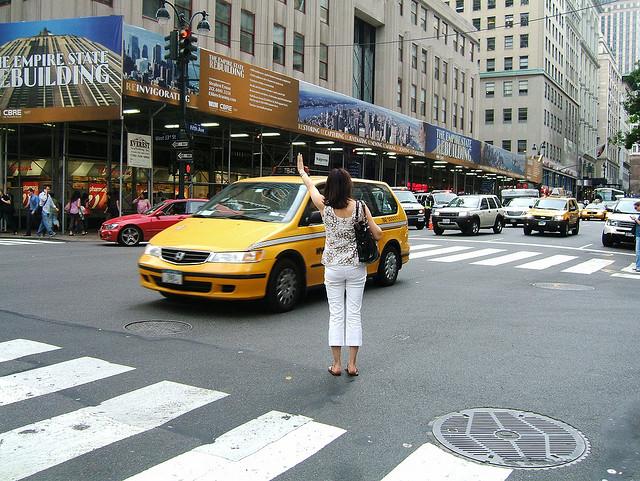Taxi sharing in NYC could be a godsend — but would New Yorkers go for it?
A woman hails a cab outside the Empire State Building in New York City.
Researchers at MIT's Senseable City Lab have found that if New York City residents shared cab rides, they could dramatically shorten their trips while slashing the number of cabs on the street by 40 percent. So what's not to like?
A lot, it turns out. First, would time-obsessed New Yorkers be willing to sacrifice minutes of their lives for the greater good — or to save half a taxi fare? Would city residents be willing to share a cramped cab with a stranger? And what do cab drivers think about it?
Steven Strogatz, a professor of applied math at Cornell University and one of the authors of the study, says he understands there are a lot of real-world issues to consider. Nevertheless, he and his colleagues believe shared mobility — whether it’s taxis, cars or bicycles — has the potential to solve a number of transportation problems, from clogged streets to air pollution.
The study used a data from around 170 million taxi trips taken in New York City in 2011. During the Bloomberg era, Strogatz says,, everything was about "big data," including using GPS to track the times and locations of every taxi pickup and drop-off.
Looking at all this data raised a natural question: If people shared cab rides, how might money, traffic and pollution problems improve?
“With a data set of this size, it's tricky to think about [because] these cabs are not only driving around in space, but in time,” Strogatz says. “It's no good if two cabs are near each other but one comes an hour later. So, it's just an enormously complicated computer science problem.”
(The researchers have collated the data into an interactive web site called hubcap.org.)
One of the trickiest things to consider, Strogatz says, was the maximum delay that riders would tolerate in a shared ride versus a solo one. “Are people content to be late by three minutes if it means it's only going to cost them half as much?” he asks. “So we used numbers like three minutes. The longest delay we ever considered was five minutes.”
Implementing the study’s findings in any practical way will require an app on the model of ride-sharing services like Uber and Lyft, Strogatz says. The system would be useless if it doesn't achieve a critical mass of passengers and taxi drivers — and there is still a lot of resistance from both groups.
Nevertheless, options are already springing up. David Mahfouda is the CEO of Bandwagon, an app that helps strangers share taxis in New York and other cities. He believes shared ride systems will reshape transportation in fundamental ways.
“With the ubiquity and advent of mobile computing, we're at a place where we can basically re-purpose cars and roads and build them around the idea of moving populations instead of individuals,” he says.
And Strogatz says the data is compelling: In 2011, had a ride-sharing app existed, every passenger using it would have had about 100 opportunities per trip to share a cab with another person. “That is, anyone asking would have not come up empty,” Strogatz explains. “They would have had 100 possibilities and the algorithm that we figured out would [have found] the best possible match.”
But of course, there's a potential downside. Even if New York and other cities decide they want to design cab-sharing systems, Strogatz cautions they shouldn't neglect mass transit.
“After all, we already have very green technology in subways and buses,” he says, “and if we start getting more people sharing cabs [and] that undercuts the subway or other mass transit systems, that may end up making things worse — not to mention that we could be putting a lot of cab drivers out of business.”
This story is based on an interview that aired on PRI's Science Friday with Ira Flatow
